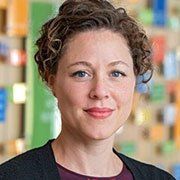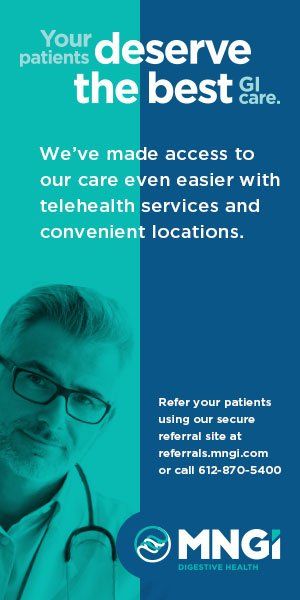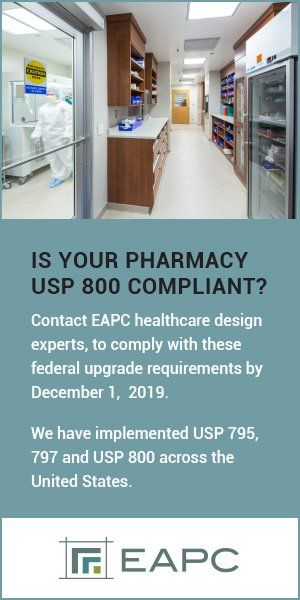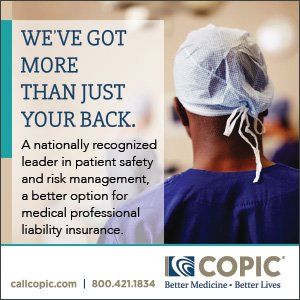Interview
The Importance of Medical Associations
Sarah Traxler, MD
President Twin Cities Medical Society
What can you tell us about your recent decision to discontinue formal ties with the MMA?
This was not an easy decision by any means. Separating from the MMA, a strong and historic organization serving physician interests across the state, meant giving up some influence and support. In the end, we knew that to continue to advocate for all the relevant public health initiatives that our membership is passionate about, we needed to be able to move forward independently. This next phase will give our organization more freedom to evolve along with our profession and better support not only our physicians, but also our medical students who represent the next generation of public health leaders.
It’s important to note that the MMA continues to be an important partner of TCMS. While our formal relationship has changed, we are excited to continue to collaborate with the MMA in new ways in the future.
Medical associations and societies, and really every kind of professional association, have seen sharp membership declines. What are some of the reasons for this?
Historically, associations and societies in any industry were created to help members share best practices and collaborate on initiatives. The internet and social media have created environments where it’s much easier to find colleagues with similar interests, organize, and build momentum both online and in person. We believe to succeed well into the future, collaborative organizations like ours require a new strategy.
Over the years, TCMS’s mission and work has become more and more focused on public health advocacy driven by physicians and supported by partners across the state and country. We want to reinforce and strengthen our support of our member physicians’ advocacy work in a way that is more adaptive and flexible. Uncoupling from our formal agreement with the MMA was just the beginning of a new strategy which will eventually become an innovative new model for TCMS that will benefit the health of our communities and support the work of our members.
Physicians are increasingly becoming more than just doctors who treat illness.
Why is it important for professional medical associations to continue?
While medical associations do need to evolve and adapt, they are still incredibly important for our profession and the healthcare industry as a whole. Physicians are increasingly becoming more than just doctors who treat illness. We are moving into the role of advocate not only for our patients’ health but the health of the community as well. Simply put, doctors are moving toward a role that is much more relational, rather than prescriptive. I’d like to think that instead of “fixing” things like disease and injury, we’re working to promote better health and proactively provide the resources and conditions that support health outside of the clinic walls.
To be successful in this new healthcare landscape, we need to collaborate even more with our medical colleagues. An association like TCMS provides the structure and coordination to keep us moving forward toward these higher goals despite the demands of our daily jobs.
What are some of the ways the Twin Cities Medical Society is addressing these issues?
One of the first steps in addressing these issues is acknowledging that the needs of physicians have changed. While issues like reimbursement and scope of practice will undoubtedly continue to be important, there is a growing hunger in today’s physicians to reclaim their roles as healers and create conditions in which their patients can have good health and live fulfilling lives. The need for good health extends far beyond the clinic walls, and TCMS provides physicians with an opportunity to effect the kind of societal change that will benefit patients’ health in a way that a hospital or clinic alone simply cannot facilitate.
While I am incredibly grateful for the opportunity to provide care to my patients, I know I am not alone in feeling frustrated that I often provide treatment for preventable conditions. The frustration is rooted in the knowledge my patients don’t always have the resources to invest in their own health and my clinical-facing role will only go so far. TCMS is creating a space where physicians can work together to make real changes in the conditions that impact our patients’ health on a societal level.
Creating a medical association wholly dedicated to advancing community health is a big shift, but we are confident that in doing so we will better meet the needs of our wider community and today’s physician.
What should governance of a medical association in 2021 look like?
For decades, medical associations have used annual House of Delegates meetings as their method of legislation and policymaking. While the House of Delegates model has many strengths, the past year has highlighted the need for a nimbler form of governance that allows our organizations to be responsive to the rapidly changing needs of our community.
In truth, I don’t think there is necessarily one right model for medical association governance. Rather, I think we need to create new ways of governing that are grounded in democratic processes, that create space for those who haven’t been served by organized medicine in the past, and that have the flexibility to grow and change over time.
Why is it important to keep partisan politics out of medical society policymaking and how can this be done?
I think if you look at the definition of “partisan” it means being prejudiced toward a particular cause. This goes against the nature of our work as physicians, and as scientists really. Our job is to remain objective and gather all the data to make the right diagnosis and choose the best treatment for our patients. That also includes ensuring individuals have access to the resources needed to make choices for their best health before they become ill. Being prejudiced or partisan toward anything just doesn’t fit in that scenario. Frankly, politics are a powerful tool to drive the right policies forward, but party agendas should never be a factor in deciding what’s “right” to begin with.
Physicians have tremendous credibility when it comes to public opinion. It’s important for us to use that power to influence public policy in the right direction. We are advocates of public health, and you cannot improve the health of the community without good, strong policies in place at the level of local, state, and national government. At TCMS we believe it is our responsibility to understand what drives good and poor health, to carefully evaluate the best science) available, and to create better laws when needed.
Please tell us about how things are going with Honoring Choices Minnesota.
For over a decade, Honoring Choices Minnesota (HCM) has been a leading convener and connector - engaging both providers and the community in Advance Care Planning (ACP) conversations throughout Minnesota and nationally. ACP is a powerful tool for health equity which ensures that all individuals have a voice in their own healthcare decisions. Since 2017, we have been working to develop culturally specific ACP tools and resources, including with Volunteers of America, The Center of American Indian and Minority Health and most recently in partnership with the St. Cloud Somali community.
The significance of ACP became painfully obvious throughout the COVID-19 pandemic. In response, HCM developed a COVID-19 ACP Planning Guide and COVID-19 Treatment Preferences checklist for individuals to consider their care preferences if they contract COVID, and for providers to engage their patients in COVID-specific goals of care conversations.
In addition to the need for a COVID ACP response, the pandemic also highlighted the growing need for greater accessibility to trained ACP facilitators. In April of 2020, in partnership with Riverwood Healthcare Clinic, we successfully piloted an ACP Helpline. This pilot became the foundation for a new multi-community ACP Helpline pilot that will launch in September 2021 with the hope of extending this service statewide.
Please tell us about your work with the Physicians Wellness Collaborative.
We are proud to build on Physicians Serving Physicians 30+ year legacy of providing confidential support for physicians experiencing substance use disorders by launching a new initiative aimed at expanding our wellness offerings called the Physicians Wellness Collaborative (PWC) in 2020. PWC provides eight confidential, free counseling sessions for physicians, residents, medical students and their immediate family members.
We’ve seen an incredible response to our work over the past year and a half. We have recently extended our free counseling services for our Advance Practice Providers colleagues. We have also partnered with the Metro Minnesota Council on Graduate Medical Education on two innovative new programs: setting up proactive wellness appointments with licensed mental health professionals for residents as they enter into their program and a pilot program using a mobile app, PWC PeerConnect, which is confidential space for residents to connect with recent residency graduates and practicing physicians who are passionate about supporting residents as Peer Support Mentors.
We are also dedicated to continuing to address systemic barriers to physician wellness, including partnering with other organizations to change medical licensure language which prevents many Minnesota physicians from accessing mental health services.
How are you addressing institutional or systemic racism in health care?
The depth and urgency of the need to combat systemic racism has been reinforced over the past year, and we have seen strong leadership around health care system change from local physician and medical associations. TCMS will continue to focus on how systemic racism creates conditions outside the clinic that lead to ill health.
Public health advocacy around menthol and other flavored tobacco – a key driver in racial disparities in tobacco use and ultimately tobacco-related death and disease—will continue to be an emphasis of our organization’s work. Additionally, we are committed to continuing our work to address the harm of sugary drinks which, like tobacco, are disproportionately and aggressively marketed toward Black and Latino children. We are actively working to extend our model of physician education and advocacy to support communities working on other pressing health issues like universal school meals, a living wage and new models of public safety.
What would you like physicians to know about the Twin Cities Medical Society?
Twin Cities Medical Society has provided me with opportunities to advocate on issues that are close to my heart, to mentor the next generation of physician-advocates, and to connect with an incredible community of physician activists. I warmly invite you to attend one of the engagement opportunities we will be hosting this Fall, and join us in working to create real change for the health of our community!
Sarah Traxler, MD,
serves as Chief Medical Officer of Planned Parenthood North Central States and is President of Twin Cities Medical Society. She is a board-certified obstetrician gynecologist. Dr. Traxler has special interests in reproductive health policy and healthcare for the underserved.
MORE STORIES IN THIS ISSUE












